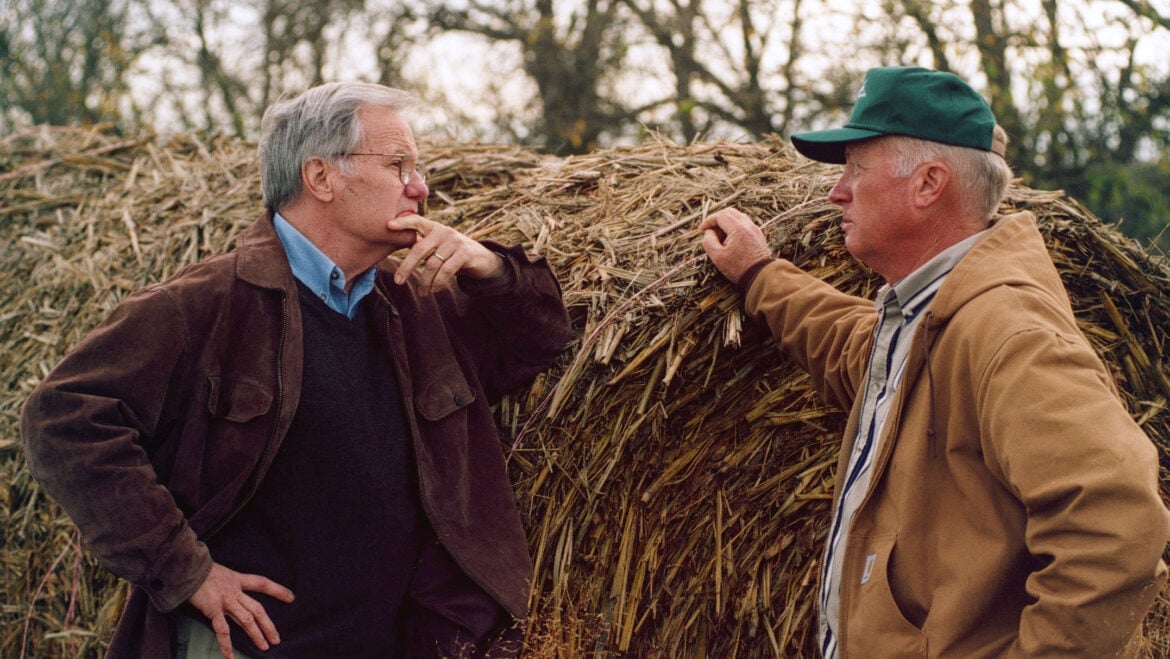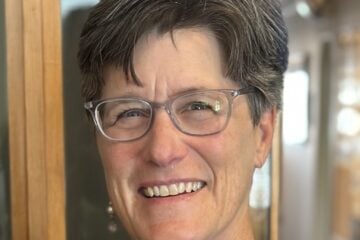How we can extend Bill Moyers’ legacy to public service media

Bill Moyers talks with Kansas farmer Charlie Melander in “Earth on Edge,” a 2019 documentary for PBS.
Bill Moyers will be widely remembered as the leading television journalist of his generation. What is less well known is how well revered he will remain among the countless friends and colleagues whom he mentored and encouraged over the years.
We always hope that our political and journalism heroes are as warm and exceptional in real life as we imagine them to be via their mediated images. Those who knew him understood that to have very much been the case with Bill Moyers. Here’s how I learned that, and how it leads to a way of honoring his memory.
It was a fortuitous, chance encounter in the old main rotunda of Washington’s National Airport in the spring of 1972. I was early for a flight up to New York on some PBS business. With a little time to kill, I was reading a newspaper when I looked up to see someone I’d never met, but instantly recognized as Bill Moyers, passing by on the way to his gate.
It was a remarkable coincidence. In just the preceding few days, our small PBS programming staff had been intensely discussing second-season plans for our ambitious but underfunded and undefined new national public television network. Included among them was to be a new show that would headline our fledgling public affairs efforts — Bill Moyers Journal.
But there was more to it for me. While I knew Moyers by reputation, the programming discussions had reminded me about how much he had already affected my own young life. During the Kennedy administration, he’d played a major role in founding the U.S. Peace Corps, in which I had recently served. Then, as President Johnson’s key assistant, he’d helped craft the Carnegie Commission’s deliberations and public broadcasting legislation that had led to the formation of PBS — and thereby to my new job as its first research director.
So Moyers had been much on my mind that week, and now here he was, coming my way.
I hesitated for a moment — should I step out into his path and introduce myself? He was moving quickly toward his own flight — a busy man, doubtless with much on his mind and possibly with no interest in meeting this unknown, green PTV bureaucrat. It wasn’t lost on me that Moyers, only 10 years my senior, was already extremely accomplished — as a key player in the Great Society and civil rights initiatives, as a presidential press secretary, as a newspaper publisher — and that he was well above my station. Perhaps I should just let him pass uninterrupted . . .
But something compelled me otherwise. So, caution to the winds, I took the chance, stood up and stuck out my hand.
One of the smartest moves of my life. Far from showing any irritation, or even hesitance, Mr. Moyers took my arm and with a broad, wry smile greeted me as if we were old acquaintances. He quickly absorbed my somewhat awkward explanation about our PBS connection and then put me at ease with comments about the new show and how much he was looking forward to working together with the PBS staff and — me!
What ensued then was a full 10-minute conversation during which, and to my total surprise, he inquired about my background, academic training and aspirations for public television. As the minutes passed, there was no sign that he might have been worried about missing his flight nor any indication that he was interested at that moment in talking with anyone else in the world.
It was a stunning experience — so early in my career to be taken so seriously and intimately by someone of great stature, who only moments before had no idea that I even existed. It was also a remarkable direct experience of his journalism skills. In the limited time available, he surgically picked up all the key points about this new source.
And then we were both on our separate ways.
To my great regret, we never did really work together in any direct manner. But, as the years passed, I had the occasional immense pleasure of getting together with him over a lunch or dinner and learning more about his thinking about politics, culture, journalism and public service. And always he would inquire about me, my research, my professional growth and my evolving views on higher education and, of course, the public media we were both serving.
In time, I came to understand that he’d been paying more attention to my work than I’d had any reason to expect or deserve. Unbeknownst to me, he’d been quietly following my university career and public broadcasting scholarship. He’d apparently concluded that we were sufficiently in sync on our concerns about corporate media in American democracy and important media policy issues that were variously shaping and threatening the public media project to monitor what I might be writing. So, while his authority and insights were far out ahead of mine, he had spotted some useful elements for his own thinking, and he was always generous in public references to those contributions.
The remarkable thing about this relationship, and the point of this story, is that it was not at all unique to me. It turned out that as part of his restless intellect, prodigious reading and wide-ranging discourse, Moyers regularly identified, engaged and drew from countless other young scholars, producers, writers and journalists.
His audiences witnessed that extraction skill at the highest public levels in the thousands of hours of interviews he conducted for his steady stream of public affairs shows. But among the many things that set him apart was this special skill at privately finding the value in everyone around him — not just among the luminaries — and encouraging their work. I’ve heard countless versions of my own National Airport/Bill Moyers story – so many, in fact, that I have come to understand that across the media there is a widespread informal network of acolytes who, while perhaps largely unknown to one another, are beneficiaries of that common Moyers mentoring experience.
Many of the tributes for Moyers have already provided considerable insight into his role as the leading U.S. television journalist of the post-Murrow generation. For the most part they’ve also accurately portrayed his struggles with commercial media and how much better his sensibilities fit into the independent, long-form freedoms of public-service television. They all correctly suggest that American political discourse is going to be much diminished by his loss.
But those working inside public media also know that we’re going to miss something else — his intense dedication to our cause. There was no better, more articulate advocate for the public service media enterprise than Bill Moyers. Had he remained healthy, we’d have surely turned to him yet again to help guide the resistance to the current existential assaults on this great institution. In fact, one worries that in his final days he may have been distressed at what’s been occurring and the threats to so much of what he stood for.
So, whatever our individual relationships to Bill Moyers — closely personal or at more distance — we owe it to him and his memory to carry on the struggle in his own image. Rather than despair, as he surely would not have done, we must take a page from his book and find ways to help the American people, our philanthropies and businesses, and even the government itself rededicate themselves to this calling.
We can extend the Moyers legacy by energizing that wide network of all those he influenced throughout his career and encouraging its members to pass along to another generation the values and techniques of his journalism, his fierce advocacy for the institution that can foster it, and his abiding concerns for the health of the American democratic experience.
Willard D. (“Wick”) Rowland, Ph. D., is Dean & Professor Emeritus, School of Journalism & Mass Communications, University of Colorado Boulder, and President & CEO Emeritus, Colorado Public Television (PBS 12, KBDI), Denver.






Inspiring and heartfelt—thank you for this powerful tribute to Bill Moyers. It meaningfully honors his legacy and calls us to uphold his vision for public service media and democratic integrity. Meanwhile, e-file IRS Form 2290 securely with TaxZerone and get your stamped Schedule 1 in minutes. Simplify your Heavy Highway Vehicle Use Tax Return with a fast, accurate, and hassle-free online filing experience. Visit: https://www.taxzerone.com/excise-tax/pre-file-form-2290/.
Insightful and inspiring—thank you for this heartfelt tribute to Bill Moyers. It meaningfully honors his legacy and calls us to uphold the values he championed in public service media. Meanwhile, e-file IRS Form 2290 securely with TaxZerone and get your stamped Schedule 1 in minutes. Simplify your Heavy Highway Vehicle Use Tax Return with a fast, accurate, and hassle-free online filing experience. Visit: https://www.taxzerone.com/excise-tax/pre-file-form-2290/.